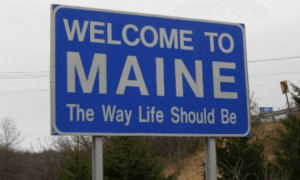The leadership of the Democrat majorities in both houses of the Maine State Legislature showed zero interest in a comprehensive election security reform bill put forward by Republican State Rep. Heidi Sampson.
“They dispatched my bill in three and one-half minutes without explanation,“ said Ms. Sampson in an interview with The Epoch Times. ”They flat-out rejected a common-sense plan to return to the simple practices that have been historically proven to be effective. They didn’t want to listen. By their inaction, the Democrats have shown their cards.”
On Feb. 22, 2024, the Legislative Council, a 10-member, bipartisan administrative organ of the Maine State Legislature charged with screening and approving requests to introduce bills for consideration, voted 6–4 along party lines to reject Ms. Sampson’s proposal.
Maine was the first state to be presented with the model bill.
The Kline-Wolf plan seeks to rectify the defects remaining in election security that have been identified by watchdog groups around the country since the 2020 election.
No More Mass Mailing of Ballots
The Sampson bill requires photo identification of voters, that an absentee ballot can only be obtained after a voter requests one, mandates the public, hand counting of all votes, makes voting a one-day activity using paper ballots, eliminates ballot harvesting, and bans private and NGO money from paying for election functions. The measure also makes election vendors subject to public records requests, requires all ballot management activities to be observable by representatives from political parties, and ensures public accessibility to the computer codes of election equipment.
To deter violations, the bill provides criminal penalties for specific offenses. An election worker who is willfully and wrongfully obstructing the work of a poll watcher may be temporarily removed from the polling place and can be charged with a crime.
“The Democrats on the Legislative Council have clearly demonstrated they are willing to embrace and protect any opportunity to cheat,” Ms. Sampson told The Epoch Times.
Speaker of the House Rachel Talbot Ross, House Majority Leader Maureen Terry, Senate President Troy Jackson, and Senate Majority Leader Eloise Vitelli, all Democrats, did not respond to a request for comment.
Other important features of the Sampson bill included a ban on pauses in the counting of absentee ballots, absentee ballot envelopes not signed or properly witnessed shall not be opened, absentee ballots must be received by election officials by the closing of the polls on Election Day, and counting absentee ballots cannot begin until after the polls close.
To prevent the counting of fake absentee ballots or an absentee ballot being counted more than once, each must have a watermark and/or a unique barcode or microchip that does not contain the identity of the voter. The bill guarantees the state legislature legal standing and the right to intervene in election management lawsuits and extends a three-year statute of limitations on election cases to up to six years if intentional efforts to conceal violations occur.
Another provision of the Sampson bill states that the existence of a federal investigation shall not preclude or deter election officials from engaging in activities that ensure that state elections are being conducted lawfully.
“Our constitutional rights, laws, and courts are being used, twisted, and subverted by some in order to destroy the very system that fostered and protects our liberties,” Ms. Sampson said.

Ms. Sampson described the current election administration system in Maine as a “shell game” loaded with “obfuscation.”
“What’s wrong with going back to a simple, decentralized, transparent, low-cost, system that was autonomous and accurate?
Bloated Voter Rolls
Ms. Sampson cited a report by a team of citizen investigators called We the People Maine that compared data from the Maine Secretary of State’s office and the U.S. Census Bureau and found that in 2020, the number of registered voters on the state voter rolls was 102 percent of the voting age population.
Of Maine’s 16 counties, 10 had voter registration rates at or above 100 percent. Six of the 10 had rates between 105 and 108 percent.
“What can go wrong with that picture?” said Ms. Sampson.
Had it been passed by the legislature and signed by Democrat Gov. Janet Mills, the Sampson election security reform package was slated to go into effect on July 1, 2024.
Ms. Sampson told The Epoch Times that she was disappointed with the Democrats’ lack of interest in meaningful election security reform, but stated, “The beat goes on.”
“At least we smoked the rats out of the woodshed,” she said.
Original News Source Link – Epoch Times
Running For Office? Conservative Campaign Consulting – Election Day Strategies!


